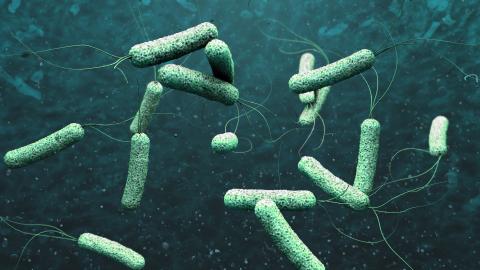Research
IDMEL works in partnership with colleagues across Ohio State's campus and around the world to advance our research mission. Here are some of our research initiatives and the results they have achieved.
One Health Eastern Africa Research Training Program

IDMEL is the leading laboratory in the NIH-funded D43 training grant, One Health Eastern Africa Research Training Program. coordinating research activities for PhD and postdoctoral fellows participating in the program. The primary objective is to enhance the capacity of partner academic institutes in Eastern Africa, specifically in Ethiopia, Kenya, and Tanzania, through a comprehensive PhD and postdoctoral fellowship program focused on foodborne, waterborne, and vector-borne diseases. Candidates in this program spend 1.5 years at Ohio State University and 2.5 years at their home universities. This program engages Ohio State faculty members from six different colleges, encompassing Arts and Sciences, Food, Agricultural and Environmental Sciences, Medicine, Nursing, Public Health, and Veterinary Medicine. IDMEL, as the coordinating lab, facilitates faculty and student networking, fosters the growth of international scholars, and contributes to narrowing the gap in scientific knowledge and research capacity for both Ohio State and our Eastern African partners. Furthermore, this project significantly enhances Ohio State's visibility in the region, strengthening partnerships with academic and other institutional collaborators.
- Ibrahim, R.A., Mekuria, Z., Wang, S.H., Mediavilla, J.R., Kreiswirth, B., Seyoum, E.T., Mariam, S.H., Gebreyes, W.A., Kefale, T.A., Guma, G.T. and Berhe, N., 2023. Clonal diversity of Staphylococcus aureus isolates in clinical specimens from selected health facilities in Ethiopia. BMC Infectious Diseases, 23(1), pp.1-9.
- Tigistu-Sahle, F., Mekuria, Z.H., Satoskar, A.R., Sales, G.F., Gebreyes, W.A. and Oliveira, C.J., 2023. Challenges and opportunities of molecular epidemiology: using omics to address complex One Health issues in tropical settings. Frontiers in Tropical Diseases, 4, p.1151336.
- Obanda, B.A., Gibbons, C.L., Fèvre, E.M., Bebora, L., Gitao, G., Ogara, W., Wang, S.H., Gebreyes, W., Ngetich, R., Blane, B. and Coll, F., 2022. Multi-drug resistant Staphylococcus aureus carriage in abattoir workers in Busia, Kenya. Antibiotics, 11(12), p.1726.
- De Mesquita Souza Saraiva, M., Lim, K., do Monte, D.F.M., Givisiez, P.E.N., Alves, L.B.R., de Freitas Neto, O.C., Kariuki, S., Júnior, A.B., de Oliveira, C.J.B. and Gebreyes, W.A., 2022. Antimicrobial resistance in the globalized food chain: A One Health perspective applied to the poultry industry. Brazilian Journal of Microbiology, pp.1-22.
International Congress on Pathogen Genome at Human Animal Interface

Through the International Congress on Pathogen Genome at Human Animal Interface, IDMEL, in partnership with the GenomeTrakr network, conducts the sequencing of over 1000 cultured Salmonella enterica genomes. This initiative is a crucial component of the U.S. Food and Drug Administration's (FDA) Whole Genome Sequencing (WGS) surveillance program, aimed at swiftly identifying and addressing outbreaks of foodborne illnesses at the human-animal interface.
- Yebra, G., Harling-Lee, J.D., Lycett, S., Aarestrup, F.M., Larsen, G., Cavaco, L.M., Seo, K.S., Abraham, S., Norris, J.M., Schmidt, T. and Ehlers, M.M., 2022. Multiclonal human origin and global expansion of an endemic bacterial pathogen of livestock. Proceedings of the National Academy of Sciences, 119(50), p.e2211217119.
- Saraiva, M.D.M.S., Benevides, V.P., Silva, N.M.V.D., Varani, A.D.M., Freitas Neto, O.C.D., Berchieri Jr, Â., Delgado-Suárez, E.J., Rocha, A.D.D.L., Eguale, T., Munyalo, J.A. and Kariuki, S., 2022. Genomic and Evolutionary Analysis of Salmonella enterica Serovar Kentucky Sequence Type 198 Isolated From Livestock In East Africa. Frontiers in Cellular and Infection Microbiology, 12, p.772829.
Campylobacter Genomics and Enteric Dysfunction

Campylobacter Genomics and Enteric Dysfunction (CAGED) is dedicated to investigating the origins and transmission pathways linked to Campylobacter infections in young children. These bacterial infections have a recognized impact on child well-being, notably by disrupting the gut microbiome, nutrition, and growth. Ongoing research has shown that the elevated prevalence of Campylobacter in early childhood is connected to adverse health outcomes in children, such as stunted growth and environmental enteric dysfunction.
This study, supported by the Bill & Melinda Gates Foundation, is advancing into its longitudinal phase with three main objectives:
- To evaluate the occurrence, composition of species, and genetic diversity of both thermotolerant and non-thermotolerant Campylobacter species in young children, adults, livestock, and other potential sources in rural eastern Ethiopia.
- To determine the sources of Campylobacter infections in young children, whether they originate from humans, livestock, or environmental reservoirs, based on the genetic characteristics of Campylobacter species.
- To examine the connections between the presence of Campylobacter species, the composition of gut microflora, and negative health outcomes in children, such as stunted growth and environmental enteric dysfunction.
Moreover, alongside the investigation into Campylobacter-related pathways, this project is committed to fostering capacity-building opportunities with local collaborators. This includes cross-training in microbiology and social science concepts and skills. Additionally, the project promotes adaptive learning by providing laboratory equipment, expert guidance, and reagents for all testing purposes.
- Havelaar, A.H., Brhane, M., Ahmed, I.A., Kedir, J., Chen, D., Deblais, L., French, N., Gebreyes, W.A., Hassen, J.Y., Li, X. and Manary, M.J., 2022. Unravelling the reservoirs for colonisation of infants with Campylobacter spp. in rural Ethiopia: protocol for a longitudinal study during a global pandemic and political tensions. BMJ open, 12(10), p.e061311.
- Chen, D., McKune, S.L., Singh, N., Yousuf Hassen, J., Gebreyes, W., Manary, M.J., Bardosh, K., Yang, Y., Diaz, N., Mohammed, A. and Terefe, Y., 2021. Campylobacter colonization, environmental enteric dysfunction, stunting, and associated risk factors among young children in rural Ethiopia: a cross-sectional study from the campylobacter genomics and environmental enteric dysfunction (CAGED) project. Frontiers in Public Health, 8, p.615793.
- Terefe, Y., Deblais, L., Ghanem, M., Helmy, Y.A., Mummed, B., Chen, D., Singh, N., Ahyong, V., Kalantar, K., Yimer, G. and Yousuf Hassen, J., 2020. Co-occurrence of Campylobacter species in children from Eastern Ethiopia, and their association with environmental enteric dysfunction, diarrhea, and host microbiome. Frontiers in public health, 8, p.99.
Laboratory Director
Wondwossen Gebreyes, DVM, PhD

Hazel C. Youngberg Distinguished Professor, Molecular Epidemiology
I am a member of National Academy of Medicine (NAM). I have a strong interest and track record of leading molecular epidemiology research and training as well as global one health capacity building programs. I have established strong research and education programmatic partnerships in Brazil, Ethiopia, Kenya, Mexico, Tanzania, and Thailand. I have a proven professional expertise in research and education in eastern Africa as demonstrated by my scholarly activities including serving as a PI to two NIH Fogarty research training programs including a D43 and R25; cooperative agreement award from the CDC (U2/U3), as well as Co-PI on Bill & Melinda Gates Foundation, National Cancer Institute (P30 supplement) and other foundations. My scholarly accomplishments include more than 210 peer-reviewed publications mainly in molecular epidemiology of foodborne bacterial pathogens with emphasis on antimicrobial resistance.
Publications
This is a curated collection of publications from the Infectious Disease Molecular Epidemiology Laboratory from the last two years. These papers represent our unwavering commitment to advancing the understanding of infectious diseases and contributing to the broader scientific community's knowledge in the field.
View a complete list of publications.
- Ibrahim, R.A., Mekuria, Z., Wang, S.H., Mediavilla, J.R., Kreiswirth, B., Seyoum, E.T., Mariam, S.H., Gebreyes, W.A., Kefale, T.A., Guma, G.T. and Berhe, N., 2023. Clonal diversity of Staphylococcus aureus isolates in clinical specimens from selected health facilities in Ethiopia. BMC Infectious Diseases, 23(1), pp.1-9.
- Tigistu-Sahle, F., Mekuria, Z.H., Satoskar, A.R., Sales, G.F., Gebreyes, W.A. and Oliveira, C.J., 2023. Challenges and opportunities of molecular epidemiology: using omics to address complex One Health issues in tropical settings. Frontiers in Tropical Diseases, 4, p.1151336.
- Deblais, L., Ojeda, A., Brhane, M., Mummed, B., Hassen, K.A., Ahmedo, B.U., Weldesenbet, Y.D., Amin, J.K., Ahmed, I.A., Usmane, I.A. and Yusuf, E.A., 2023. Prevalence and Load of the Campylobacter Genus in Infants and Associated Household Contacts in Rural Eastern Ethiopia: a Longitudinal Study from the Campylobacter Genomics and Environmental Enteric Dysfunction (CAGED) Project. Applied and Environmental Microbiology, pp.e00424-23.
- Yebra, G., Harling-Lee, J.D., Lycett, S., Aarestrup, F.M., Larsen, G., Cavaco, L.M., Seo, K.S., Abraham, S., Norris, J.M., Schmidt, T. and Ehlers, M.M., 2022. Multiclonal human origin and global expansion of an endemic bacterial pathogen of livestock. Proceedings of the National Academy of Sciences, 119(50), p.e2211217119.
- Obanda, B.A., Gibbons, C.L., Fèvre, E.M., Bebora, L., Gitao, G., Ogara, W., Wang, S.H., Gebreyes, W., Ngetich, R., Blane, B. and Coll, F., 2022. Multi-drug resistant Staphylococcus aureus carriage in abattoir workers in Busia, Kenya. Antibiotics, 11(12), p.1726.
- Saraiva, M.D.M.S., Benevides, V.P., Silva, N.M.V.D., Varani, A.D.M., Freitas Neto, O.C.D., Berchieri Jr, Â., Delgado-Suárez, E.J., Rocha, A.D.D.L., Eguale, T., Munyalo, J.A. and Kariuki, S., 2022. Genomic and Evolutionary Analysis of Salmonella enterica Serovar Kentucky Sequence Type 198 Isolated From Livestock In East Africa. Frontiers in Cellular and Infection Microbiology, 12, p.772829.
Nurturing and empowering the next generation of leaders
Training Opportunities
IDMEL is committed to advancing knowledge and shaping the next generation of experts. Our program is the gateway to a career dedicated to unraveling the mysteries of infectious diseases and making a meaningful impact on global health.
56
Undergraduate & Professional Students
55
PhD Graduate Students
9
Post-doc Students
Education
The Infectious Disease Molecular Epidemiology Laboratory offers educational classes and opportunities at various times throughout the academic year. Here is some information on our current offerings.
-
Molecular Epidemiology of Infectious diseases (VPM-8700 & PUBH-EPI 7413)
3 Credits, Spring Semester
The course provides a comprehensive overview and detailed discussion on the core molecular and genomic epidemiologic approaches that can be used to investigate infectious diseases. It will emphasize on the application of molecular techniques and pathogen genomic data to investigate the etiology, transmission and control of infectious diseases that are relevant to veterinary medicine and public health. Lecture topics will cover the principles and application of molecular techniques, population and evolutionary genetics of pathogenic microorganisms, data analysis and interpretation. The course will also be supplemented by student driven literature review discussions and critical evaluation of relevant manuscripts via group discussions. Students planning to take this course are expected to have background in infectious diseases, microbial genetics, and molecular biology. -
Molecular Epidemiology
Self-paced
The application of molecular biology as a tool in various disciplines impacts the investigation of infectious diseases. This course will provide a comprehensive overview on the core molecular approaches that are and can be used in addressing population medicine issues and application of molecular techniques in our understanding of the etiology, transmission and control of infectious diseases that are important to veterinary medicine and public health. Theoretical and practical aspects of various molecular biology methods will be discussed in the context of epidemiological studies of infectious diseases including both bacterial and viral infections of veterinary and zoonotic significance.
Lecture topics will cover the principles and application of various molecular techniques to problems of infectious diseases; population and evolutionary genetics of pathogenic microorganisms; data analysis and interpretation. Lecture materials will also be supported with literature review of relevant manuscripts. Students planning to take this course are expected to have had some backgrounds in infectious diseases and molecular biology.
Learn more or enroll
Our Facilities
IDMEL is located on the third floor of the Veterinary Medical Academic Building (VMAB 367 and 371), 1900 Coffey Rd, at The Ohio State University. Key facilities and capabilities include:
- Bacterial Culture and Phenotyping: The lab is equipped with instruments for isolating and identifying various pathogens. It conducts phenotyping methods, including Salmonella sero-grouping and antimicrobial susceptibility testing.
- Gene Detection and Amplification: IDMEL performs gene detection and quantification through PCR and real-time PCR.
- Molecular Genotyping: Molecular subtyping is carried out using techniques like pulsed field gel electrophoresis (PFGE), AFLP, and MLST.
- DNA Sequencing: Long read DNA sequencing using ONT MK1C and MK1B